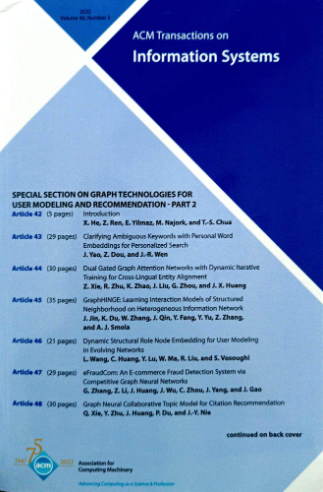Multimodal Dialog Systems with Dual Knowledge-enhanced Generative Pretrained Language Model
IF 9.1
2区 计算机科学
Q1 COMPUTER SCIENCE, INFORMATION SYSTEMS
引用次数: 4
Abstract
Text response generation for multimodal task-oriented dialog systems, which aims to generate the proper text response given the multimodal context, is an essential yet challenging task. Although existing efforts have achieved compelling success, they still suffer from two pivotal limitations: 1) overlook the benefit of generative pre-training , and 2) ignore the textual context related knowledge . To address these limitations, we propose a novel dual knowledge-enhanced generative pretrained language model for multimodal task-oriented dialog systems (DKMD), consisting of three key components: dual knowledge selection , dual knowledge-enhanced context learning , and knowledge-enhanced response generation . To be specific, the dual knowledge selection component aims to select the related knowledge according to both textual and visual modalities of the given context. Thereafter, the dual knowledge-enhanced context learning component targets seamlessly integrating the selected knowledge into the multimodal context learning from both global and local perspectives, where the cross-modal semantic relation is also explored. Moreover, the knowledge-enhanced response generation component comprises a revised BART decoder, where an additional dot-product knowledge-decoder attention sub-layer is introduced for explicitly utilizing the knowledge to advance the text response generation. Extensive experiments on a public dataset verify the superiority of the proposed DKMD over state-of-the-art competitors.具有双知识增强生成预训练语言模型的多模态对话系统
面向多模态任务的对话系统文本响应生成是一项重要而又具有挑战性的任务,其目的是在多模态语境下生成适当的文本响应。尽管现有的努力已经取得了令人瞩目的成功,但它们仍然存在两个关键的局限性:1)忽视了生成式预训练的好处;2)忽视了与文本上下文相关的知识。为了解决这些限制,我们提出了一种新的针对多模态任务导向对话系统(DKMD)的双知识增强生成预训练语言模型,该模型由三个关键组件组成:双知识选择、双知识增强的上下文学习和知识增强的响应生成。具体而言,双重知识选择组件旨在根据给定上下文的文本和视觉模式选择相关知识。然后,双知识增强上下文学习组件的目标是从全局和局部的角度将所选知识无缝地集成到多模态上下文学习中,并探索跨模态语义关系。此外,知识增强的响应生成组件包括一个修订的BART解码器,其中引入了一个额外的点积知识解码器注意子层,用于明确地利用知识来推进文本响应生成。在公共数据集上进行的大量实验验证了所提出的DKMD优于最先进的竞争对手。
本文章由计算机程序翻译,如有差异,请以英文原文为准。
求助全文
约1分钟内获得全文
求助全文
来源期刊

ACM Transactions on Information Systems
工程技术-计算机:信息系统
CiteScore
9.40
自引率
14.30%
发文量
165
审稿时长
>12 weeks
期刊介绍:
The ACM Transactions on Information Systems (TOIS) publishes papers on information retrieval (such as search engines, recommender systems) that contain:
new principled information retrieval models or algorithms with sound empirical validation;
observational, experimental and/or theoretical studies yielding new insights into information retrieval or information seeking;
accounts of applications of existing information retrieval techniques that shed light on the strengths and weaknesses of the techniques;
formalization of new information retrieval or information seeking tasks and of methods for evaluating the performance on those tasks;
development of content (text, image, speech, video, etc) analysis methods to support information retrieval and information seeking;
development of computational models of user information preferences and interaction behaviors;
creation and analysis of evaluation methodologies for information retrieval and information seeking; or
surveys of existing work that propose a significant synthesis.
The information retrieval scope of ACM Transactions on Information Systems (TOIS) appeals to industry practitioners for its wealth of creative ideas, and to academic researchers for its descriptions of their colleagues'' work.
 求助内容:
求助内容: 应助结果提醒方式:
应助结果提醒方式:


